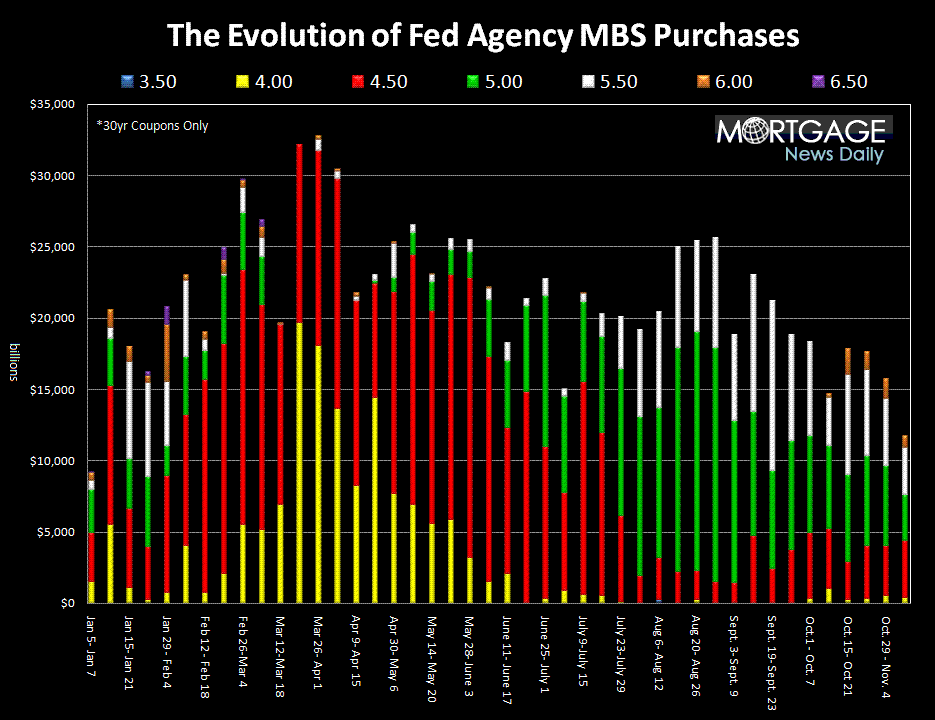The Federal Reserve today reported on their weekly purchases of agency mortgage-backed securities (MBS). In the four trading days between November 5 and November 11, the Federal Reserve purchased a total of $45.29 billion agency MBS. In those four days the Federal Reserve sold $31.79 billion agency MBS (dollar rolls). The Fed's weekly net purchases totaled $13.50 billion.
The goal of the Federal Reserve's agency MBS program is to provide support to mortgage and housing markets and to foster improved conditions in financial markets more generally. Only fixed-rate agency MBS securities guaranteed by Fannie Mae, Freddie Mac and Ginnie Mae are eligible assets for the program. The program includes, but is not limited to, 30-year, 20-year and 15-year securities of these issuers.
This week's net purchases pushed the Federal Reserve's aggregate total over the one trillion dollar mark. Since the inception of the program in January 2009, the Fed has spent $1.006 trillion in the agency MBS market, or 80.53 percent of the allocated $1.25 trillion, which is scheduled to run out in March 2010.
Of the net $13.50 billion purchases made in the week ending November 11:
- $400 million was used to buy 30 year 4.0 MBS coupons. 2.96 percent of total weekly purchases
- $4.00 billion was used to buy 30 year 4.5 MBS coupons. 29.63 percent of total weekly purchases
- $3.18 billion was used to buy 30 year 5.0 MBS coupons. 23.52 percent of total weekly purchases
- $3.33 billion was used to buy 30 year 5.5 MBS coupons. 24.63 percent of total weekly purchases
- $800 million was used to buy 30 year 6.0 MBS coupons. 5.93 percent of total weekly purchases
- $1.80 billion was used to buy 15 year 4.5 MBS coupons. 13.33 percent of total weekly purchases
72.4 percent of the mortgage-backs purchased were Fannie Mae coupons while 21.7 percent were Freddie Mac, and 5.9% Ginnie Mae. The Fed's daily purchase average was $3.38 billion per day, an increase from last week's daily average of $3.20 billion per day.
As the Federal Reserve continues the process of exiting the secondary mortgage market, a gradual slowdown in MBS purchases is expected. However, up to this point the steady withdrawal has yet to affect the performance of MBS coupons versus their benchmarks. This is a function of a generally slow pace of new loan production.
This supply and demand dynamic is illustrated by the fact that "rate sheet influential" MBS coupon yields remained relatively stable compared to those of their benchmarks last week. Also illustrating the slow down in production is the large amount of MBS the Fed sold to dealers last week. The increased number of dollar roll sales implies dealers were unable to fulfill their previous commitments to buyers, because Class A settlement was looming and dealers were unable to cover their trades (because supply was much less than demand), the Fed stepped in to provide liquidity.
Again, thank the Fed that mortgage rates did not rise this past week.
Here is a chart illustrating the evolution of the Federal Reserve's Agency MBS Purchase Program. Notice the continued reduction of weekly purchases....








